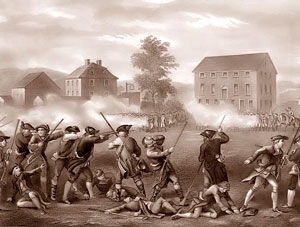The C.V. Starr Center will host Washington College history professor Ken Miller on Thursday, October 23 to talk about his new book, Dangerous Guests: Enemy Captives and Revolutionary Communities during the War for Independence. Free and open to the public, the presentation will take place at 4:30 p.m. in Hynson Lounge, Hodson Hall, on the College campus, 300 Washington Avenue.
Miller’s book, published in August, explores how life next to thousands of British and Hessian prisoners of war helped transform the ethnically diverse community of Lancaster, Pennsylvania, nurturing a budding patriotism and a new sense of identity as Americans.
The Journal of the American Revolution praised Miller’s work: “Dangerous Guests is among the best treatments of this complex topic to come out in a long time, and deserves a place on the shelf of every serious scholar of America’s transition from colonies to nation.”
Lancaster was the principal site for incarcerating enemy prisoners of war and stood at the nexus of two vastly different revolutionary worlds – one national, the other intensely local. As escalating hostilities sent thousands of prisoners to Lancaster, many of the detainees began fleeing, plotting, and rebelling, often with the clandestine support of local loyalists. General George Washington, furious over the captives’ ongoing attempts to subvert the American war effort, branded them “dangerous guests in the bowels of our Country.”
While interactions with the hostile detainees encouraged many residents to define themselves collectively against a common enemy, there also were significant numbers who sympathized with the captive Hessians or considered the British prisoners to be the true patriots in the struggle. Ultimately, as residents grew increasingly alienated from the British, they became more deeply invested in a distinct American identity.
A book signing and reception will follow Miller’s talk.



Write a Letter to the Editor on this Article
We encourage readers to offer their point of view on this article by submitting the following form. Editing is sometimes necessary and is done at the discretion of the editorial staff.